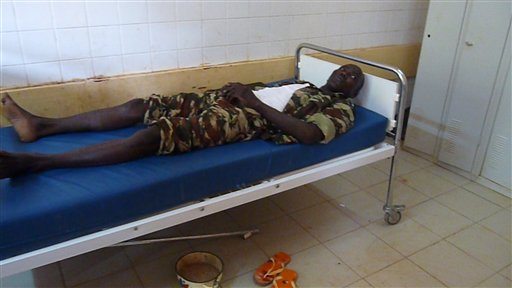(AP) Extremists claim responsibility for Niger attacks
By DALATOU MAMANE and RUKMINI CALLIMACHI
Associated Press
NIAMEY, Niger
Suicide bombers in Niger detonated two car bombs simultaneously, one inside a military camp in the city of Agadez and another in the remote town of Arlit at a French-operated uranium mine, killing 26 people and injuring 30, according to officials in Niger and France. A surviving attacker took a group of soldiers hostage, and authorities were attempting to negotiate their release.
The attack in Arlit was claimed by Moktar Belmoktar, the extremist who led the attack on a natural gas plant in Ain Amenas in Algeria in January, according to a communique posted on jihadist forums.
Both attacks were claimed by a spinoff of al-Qaida, the Movement for Oneness and Jihad in West Africa, or MUJAO, which earlier vowed to avenge the four-month-old French-led military intervention which ousted them from neighboring Mali’s north.
The timing of the attacks, which occurred at the same moment more than 160 kilometers (100 miles) apart, and the fact that the bombers were able to penetrate both a well-guarded military installation and a sensitive, foreign-operated uranium mine, highlight the growing reach and sophistication of the Islamic extremists based in Mali.
The bomb blasts are the most damaging attacks by the jihadists to date.
Of the two attacks, the higher death toll was in the desert city of Agadez, located almost 1,000 kilometers (600 miles) northeast of the capital, where the attackers punched their explosive-laden car past the defenses at a military garrison and detonated inside the base, killing 20 soldiers and injuring 16, said Niger’s Minister of Defense Mahamadou Karidjo at a press conference in Niamey. Three suicide bombers died, but a fourth escaped and grabbed a group of military cadets, said Interior Minister Abdou Labo.
Draped in an explosive belt, the attacker was threatening to blow himself up along with his hostages, said Labo, who could not confirm how many cadets were being held. The military was negotiating with the suicide bomber for their release.
At the same time the Agadez attack occurred, a different group of suicide bombers slipped past a truck entering a uranium mine in Arlit operated by French nuclear giant Areva. Once inside the campus, the car exploded, injuring 14 employees, one of whom died later, according to a statement by the French corporation and witnesses. Two suicide bombers were also killed, said Niger’s ministry of defense.
In January, when France scrambled war planes over Mali and sent in thousands of ground troops to try to take back the country’s al-Qaida-held north, the extremists vowed to hit back not just at French interests, but also at the African governments that helped them.
Niger sent 650 troops to Mali to help France combat the Islamists.
Hitting Arlit is especially symbolic. Niger produces up to 40 percent of France’s uranium imports _ a considerable amount as the European country derives 80 percent of its energy from nuclear power, according to an analysis released Thursday by global intelligence unit, Stratfor.
French President Francois Hollande told reporters during a visit to Germany that he will take every measure to protect French assets. “We will also protect our interests, because Arlit is an interest of a large French company: Areva. May everyone understand it well _ that we will not let anything happen, and will support the Nigeriens’ efforts to halt this hostage-taking and destroy the group behind these attacks.”
Up until Thursday’s twin attacks, some security analysts had doubted the strength of groups like MUJAO, which has carried out repeated suicide attacks in Mali since January with varying degrees of success. Several of the kamikaze operations killed only the bomber.
Residents in the two towns remarked on how closely coordinated the attacks appear to have been, taking place just moments apart at 5:30 a.m., a time when many in the majority-Muslim nation are laying their carpets toward Mecca in the first of the day’s five prayers.
Alhousseiny Moussa, a resident of Agadez, was walking to the mosque when he heard the boom. “I heard the explosion and immediately after, I heard a volley of gunfire. The area where it happened was inside the military camp, and it’s now been roped off so we cannot go in,” he said.
Al-Qaida’s affiliate in Africa and groups allied with it seized the northern half of Mali in April of last year. They pushed into major towns, setting up their own administration and alarming western nations who saw it as precursor to a new Afghanistan. In fact, for nearly a decade before that they had already made themselves at home in Mali, using its remote and lawless northern reaches to train fighters and hold the European hostages they kidnapped _ including many from Niger.
In 2008, they grabbed two Canadians on the outskirts of Niger’s capital, including United Nations special envoy Robert Fowler, who was held for 130 days before a ransom was negotiated. Two years later, al-Qaida in the Islamic Maghreb infiltrated Arlit, grabbing seven employees of Areva and one of its contractors, SATOM.
Four of them _ all French nationals _ are still being held by the terror cell more than two years later. The group has repeatedly threatened to execute them in retaliation for the French-led intervention in Mali
Late Thursday, SITE Intelligence released a partial transcript of a communique signed by Moktar Belmoktar, claiming to have taken part in the attack on Arlit alongside MUJAO. The attack is the first by Belmoktar’s brigade, which calls itself “Those Who Sign In Blood,” since the catastrophic assault on a BP-operated gas plant in Algeria in January. In a four-day standoff, 37 foreign hostages, including American, British, Irish, Norwegian and Japanese nationals, were killed.
___
Callimachi contributed to this report from Dakar, Senegal. Associated Press writers Angela Charlton, Jamey Keaten and Sarah DiLorenzo contributed to this report from Paris.

COMMENTS
Please let us know if you're having issues with commenting.